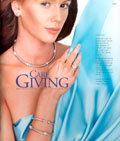Inside, in purple type on cream, appears an inscription whose intermittent capitalization and oversized words convey the kind of urgency associated with teenage girls:
"COMPASSION can be defined as our capacity to care for other living beings. Yet it goes a little deeper than that. Compassion REQUIRES ACTION--giving of our time, money, or experience wherever there's a need. Since it's available in SUCH ABUNDANCE, we sometimes take this feeling for granted. But, oh, its power! Compassion is the ultimate salve we can place upon the UNIVERSAL FEELINGS of despair, pain, or regret. Which means that even sometimes the simplest act of KINDNESS CAN define a moment. Or CHANGE A LIFE."
 |
|
| "Care Giving": Neiman Marcus nurtures your inner shopper with silver baubles |
On page 40, the mystery is made clear: Each year, the NM Foundation donates "a portion of the proceeds" from the sale of a NM-exclusive item to a few select charities. This year the offering is a "Compassion Bracelet," which "explores color therapy by mixing crystals, seed beads, and semiprecious stones." (A bargain at $55.) This year's recipient(s) will be disclosed later this Spring; previous years' recipients included organizations that provide meals to kids, shelter to homeless women, and guide dogs to the blind. "Religious organizations" are never considered, "to avoid conflicts of interest."
In a note opposite the title page we get another opportunity to admire the store's wondrous compassion. A group of company associates volunteers each summer at a camp for children with cancer, while others serve different causes as donors or committee members. The chairman and CEO of the company are shown in an adjoining photo, looking valiant, though they're probably not volunteering at a summer camp, judging from their attire. Unless it's Camp Junior Tycoon.
Admittedly, this kind of thing is easy to make fun of--try and stop me!--but shouldn't we be celebrating the fact that Neiman Marcus has embraced the concept of compassion? A catalogue titled "Compassion" seems better than one titled "Avarice" or "Loot." The juxtaposition of noble sentiments and $36,000 jewelry seems jarring initially, but perhaps this is only a matter of perception: we aren't used to business and spirituality mixing. We are used to compartmentalizing the two; we still presume that spiritual things are for once-a-week piety, and the rest of the week is every-man-for-himself. It's the separation of faith and life, which is bad for both. Faith gets attenuated and vague; life gets grimy, bent around the edges.
The fighting crossed into the 20th century, if anything worsening. In the 1960s, hippies railed against soulless consumerism; in the '80s, "greedy" corporations were objects of loathing. But the fact is, business offers security that can't be matched elsewise, and gradually moneymaking won the field. Now we're both bourgeois and bohemian--"Bobos," in Brooks's coinage. Now it's okay to be smart in business, even okay to be rich. Dot-com billionaires have become folk heroes. If, in the struggle, some spiritual awareness rubbed off, if business is getting religion, is that a bad thing? If spiritual and temporal things have been mingling, perhaps it's produced a healthier balance. The "Naked Public Square" has at least got its shoes on.
 |
|
| "Act Now," says The Book, "celebrate peace, love and happiness" |
Yet the Latin root of the word--"to suffer with"--intimates that real compassion is a great deal more costly and wrenching than that. True compassion is not so self-congratulatory; true compassion "vaunteth not itself." As Jesus warned, "Beware of practicing your piety before men in order to be seen by them. ...When you give alms, sound no trumpet before you as the hypocrites do; truly, they have received their reward. ...But do not let your left hand know what your right hand is doing."
That hand, right there. The one with the $12,000 watch.

